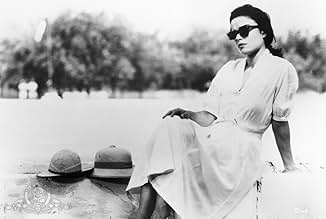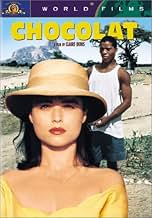Uma mulher francesa retorna à sua casa de infância nos Camarões, antigo posto avançado colonial, onde é inundada de lembranças, particularmente de Protée, sua empregada.Uma mulher francesa retorna à sua casa de infância nos Camarões, antigo posto avançado colonial, onde é inundada de lembranças, particularmente de Protée, sua empregada.Uma mulher francesa retorna à sua casa de infância nos Camarões, antigo posto avançado colonial, onde é inundada de lembranças, particularmente de Protée, sua empregada.
- Direção
- Roteiristas
- Artistas
- Prêmios
- 1 vitória e 3 indicações no total
- Direção
- Roteiristas
- Elenco e equipe completos
- Produção, bilheteria e muito mais no IMDbPro
Avaliações em destaque
The household is divided into public and private spaces. The white families rooms are private and off limits to all except Protée who works in the house while the servants are forced to eat and shower outdoors, exposing their naked bronze bodies to the white family's gazes. It becomes clear when her husband Marc (François Cluzet) goes away on business that Aimée and Protée are sexually attracted to each other but the rules of society prevent it from being openly acknowledged. In one telling sequence, she invites him into her bedroom to help her put on her dress and the two stare at each other's image in the mirror with a defiant longing in their eyes, knowing that any interaction is taboo.
The young France (Cecile Ducasse) also forms a bond with the manservant, feeding him from her plate while he shows her how to eat crushed ants and carries her on his shoulders in walks beneath the nocturnal sky. In spite of their bond, the true nature of their master-servant relationship is apparent when France commands Protée to interrupt his conversation with a teacher and immediately take her home, and when Protée stands beside her at the dinner table, waiting for her next command. When a plane loses its propeller and is forced to land in the nearby mountains, the crew and passengers must move into the compound until a replacement part can be located. Each visitor shows their disdain for the Africans, one, a wealthy owner of a coffee plantation brings leftover food from the kitchen to his black mistress hiding in his room. Another, Luc (Jean-Claude Adelin), an arrogant white Frenchman, upsets the racial balance when he uses the outside shower, eats with the servants, and taunts Aimée about her attraction to Protée leading her to a final emotional confrontation with the manservant.
Chocolat is loosely autobiographical, adapted from the childhood memories of the director, and is slowly paced and as mysterious as the brooding isolation of the land on which it is filmed. Denis makes her point about the effects of colonialism without preaching or romanticizing the characters. There are no victims or oppressors, no simplistic good guys. Protée is a servant but he is also a protector as when he stands guard over the bed where Aimée and her daughter sleep to protect them from a rampaging hyena. It is a sad fact that Protée is treated as a boy and not as a man, but Bankolé imbues his character with such dignity and stature that it lessens the pain. Because of its pace, Western audiences may have to work hard to fully appreciate the film and Denis does not, in Roger Ebert's phrase, "coach our emotions". The truth of Chocolat lies in the gestures and glances that touch the silent longing of our heart.
This film is very understated and thoughtful. There is no one single message or moral here; these are complex themes and so there is often ambiguity.
I liked this film very much. I know this will seem trite, but, not many American Directors make small films like this - ones that deal with complex themes in a gentle and intelligent manner.
I always mentioned that I felt this film had one of the "sexiest" scenes I had ever seen in a movie. One year, a 17-year-old African-American shouted, "Yes!" when he figured out the scene: the one where Protée is helping Aimée lace up her evening dress, all the while both are examining the reflection of the other in the mirror. Directors use the "mirror technique" when then want to focus on the inner conflict on the part of one or more character in a scene: this is a perfect example of the technique, and it is "sexy".
Most students had trouble understanding the end of the film. One suggested that one theme of the movie was "Africanism", and that no matter how much one loved Africa or Africans, one cannot "become" African (like the driver tried to do): one must BE African.
Você sabia?
- CuriosidadesIn a 1989 interview with Judy Stone, Claire Denis explained that the title, comes from the 1950s slang meaning "to be had, to be cheated", and thus refers to the status in French Cameroon of being black and being cheated; it is also an allusion to Protée's dark-brown skin and the racial fetishism of Africans by Europeans.
- Citações
Marc Dalens: When you look at the hills, beyond the houses and beyond the trees, where the earth touches the sky, that's the horizon. Tomorrow, in the daytime, I'll show you something. The closer you get to that line, the farther it moves. If you walk towards it, it moves away. It flees from you. I must also explain this to you. You see the line. You see it, but it doesn't exist.
Principais escolhas
- How long is Chocolat?Fornecido pela Alexa
Detalhes
- Data de lançamento
- Países de origem
- Idiomas
- Também conhecido como
- Chocolat
- Locações de filme
- Mindif, Camarões(Town where the film is set)
- Empresas de produção
- Consulte mais créditos da empresa na IMDbPro
Bilheteria
- Orçamento
- FRF 1.300.000 (estimativa)
- Faturamento bruto nos EUA e Canadá
- US$ 2.344.286
- Fim de semana de estreia nos EUA e Canadá
- US$ 2.710
- 20 de set. de 2015
- Faturamento bruto mundial
- US$ 2.344.286
Contribua para esta página




























